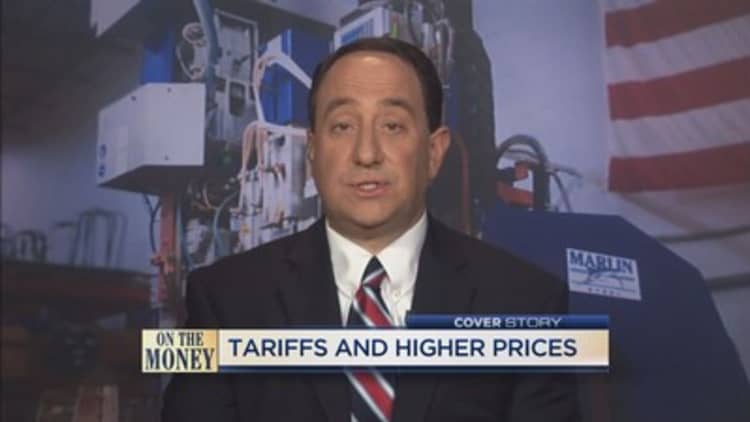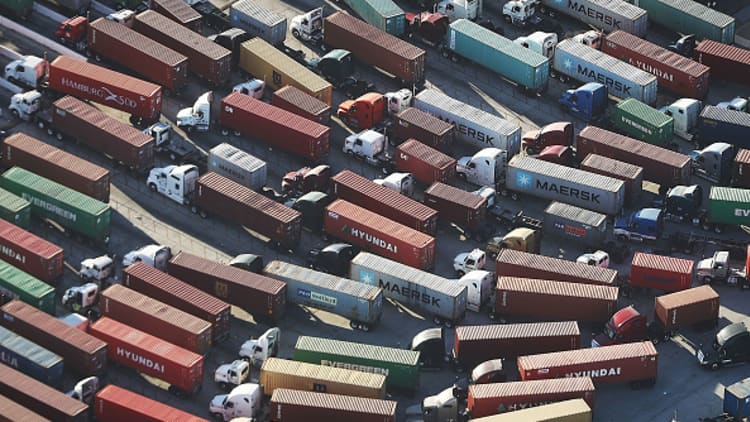
On Monday, the U.S. will impose a new set of tariffs on $200 billion worth of Chinese goods.
As the trade battle between the world's two largest economies escalates, so could the prices you pay for a wide range of goods. Last week, Target admitted it was "deeply troubled" about how tariffs would affect consumers, and its bottom line.
They're far from the only ones.
"Prices are definitely going up," said small business owner Drew Greenblatt to CNBC's "On the Money" in a recent interview. The president and owner of Baltimore-based Marlin Steel, which manufactures custom steel wire basket products for clients including General Motors, Ford and Boeing, is just one of many businesses expected to feel the fallout of higher prices.
On May 31st, the U.S. slapped a 25 percent tariff on imported steel and 10 percent on imported aluminum. Although Greenblatt buys his steel domestically, he told CNBC that "our steel prices have gone up. This makes us less competitive against German, Mexican and Chinese" competitors, he added.
"We make everything in Baltimore," Greenblatt told CNBC. "We only buy steel from Indiana and Illinois and when we lose opportunities because Chinese companies are ripping us off, then that means less steel is bought from Indiana and Illinois and less unemployed steelworkers in Baltimore are getting opportunities to buy a home, and own a car," he said.
Still, Greenblatt, who also sits on the National Association of Manufacturers' executive board as its chair of small and medium manufacturers, actually hoping that a result of the tariff policy will be better trade deals.
Greenblatt explained Marlin Steel, and other businesses like it, are being damaged by theft of their proprietary, and patented custom wire products designed by his employees.
"These tariffs are a big deal for us because we have a lot of intellectual property," he said, adding that "20 percent of our employees are degreed mechanical engineers and we definitely need our president and our nation to protect intellectual property (rights)."
The business owner added that "when an American company comes up with a clever unique idea, it's quickly taken by overseas markets. And it's unacceptable and I'm thrilled that our government is starting to protect us, or at least address these topics."
Copyright infringement and IP theft is a big sticking point between China and the U.S. Recently, the Commission on the Theft of American Intellectual Property estimated the total yearly costs of intellectual property theft ranges from $225 billion to $600 billion, with much of that attributed to China.
Greenblatt, who employs about 30 workers, says the amount of loss is "hard to quantify, but I can say for sure, we probably would be twice as big if it wasn't for all the pilfering."
He added: "We have many Chinese companies that cut-and-paste items from our website, put it on their own website pretending that they make it and they came up with those ideas. Not only is it disheartening. It's losing American jobs."
Many economists have questioned the wisdom of Trump's trade war, but Greenblatt said he was cheering the administration's efforts amid intellectual theft he called "commonplace" around the world.
Greenblatt hoped that as a result of the tariff policy, an outcome could be a trade deal characterized by "short-term pain for long-term gain." He called for a bilateral deal with China that would protect American ingenuity.
"If that's the outcome, it's going to be a big win for American manufacturing workers and it will be good for our middle class in America," he added.
On the Money airs on CNBC Saturday at 5:30 am ET, or check listings for air times in local markets.
WATCH: Trade uncertainty won't derail the economy, former adviser to VP Joe Biden says




